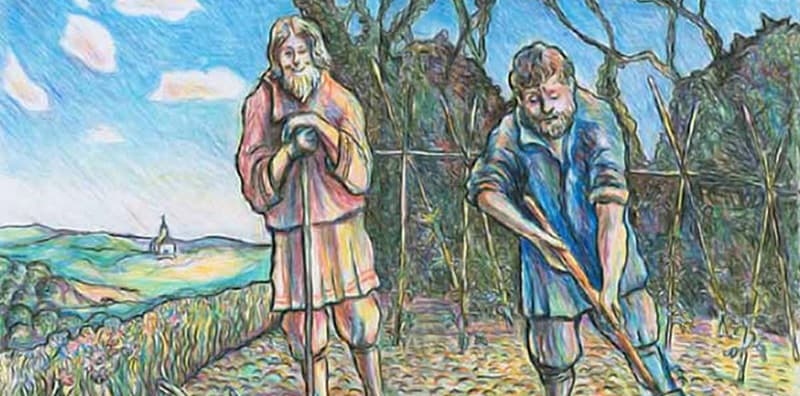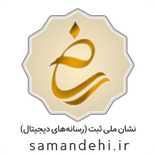The Three Questions
It once occurred to a certain king that if he always knew the right time to begin everything; if he knew who were the right people to listen to, and whom to avoid; and, above all, if he always knew what was the most important thing to do, he would never fail in anything he might undertake.
یک بار به فکر پادشاهی رسید که اگر همیشه زمان مناسب برای شروع هر چیزی را بداند؛ اگر میدانست افراد درست کداماند که به حرفهایشان گوش دهد، و از چه کسانی اجتناب کند، و مهمتر از همه، اگر همیشه میدانست مهم ترین کار چیست، هرگز در کاری که ممکن بود انجام دهد، شکست نمیخورد.
And this thought having occurred to him, he had it proclaimed throughout his kingdom that he would give a great reward to anyone who would teach him what was the right time for every action, and who were the most necessary people, and how he might know what was the most important thing to do.
و این فکر که به ذهنش خطور کرد، در سراسر پادشاهی خود اعلام کرد که به هرکسی که به او بیاموزد چه زمانی مناسب برای هر عملی است؟ و چه کسانی ضروریترین افراد (مفیدترین) هستند؟ و چگونه ممکن است بداند مهمترین کار برای انجام چیست؟ پاداش بزرگی به وی خواهد داد.
And learned men came to the king, but they all answered his questions differently.
و افراد دانشمند نزد پادشاه آمدند، اما همه آنها به سوالات او پاسخ متفاوتی دادند.
In reply to the first question, some said that to know the right time for every action, one must draw up in advance a table of days, months, and years, and must live strictly according to it. Only thus, said they, could everything be done at its proper time. Others declared that it was impossible to decide beforehand the right time for every action, but that, not letting oneself be absorbed in idle pastimes, one should always attend to all that was going on, and then do what was most needful. Others, again, said that however attentive the king might be to what was going on, it was impossible for one man to correctly decide the right time for every action, but that he should have a council of wise men who would help him to fix the proper time for everything.
برخی در پاسخ به سوال اول گفتند که برای دانستن زمان مناسب برای هر عمل باید از قبل جدولی از روزها و ماهها و سالها تهیه کرد و بر اساس آن زندگی کرد. آنها گفتند که فقط به این ترتیب میتوان همه چیز را در زمان مناسب خود انجام داد. برخی دیگر اعلام کردند که نمیتوان از قبل در مورد زمان مناسب برای هر عملی تصمیم گرفت، اما برای این که فرد در سرگرمیهای بیهوده غرق نشود، باید همیشه به همه چیزهایی که در جریان است توجه کند و سپس آنچه را که بیش از همه لازم است انجام داد. برخی دیگر دوباره گفتند، البته هر شخص باید به اتفاقات پیرامونش آگاه باشد ولی در عین حال مشاوران خردمندی نیز داشته باشد تا به وی در انجام هر کاری در زمان مناسب کمک کنند.
But then again others said there were some things which could not wait to be laid before a council, but about which one had at once to decide whether to undertake them or not. But in order to decide that, one must know beforehand what was going to happen. It is only magicians who know that; and, therefore, in order to know the right time for every action, one must consult magicians.
اما باز عدهای دیگر گفتند کارهایی هستند که نمیتوان صبر کرد تا آنها را به مشاوران واگذار کرد و آن شخص در آن زمان باید تصمیم بگیرد که آیا مسئولیت آن را بپذیرد یا خیر. اما برای تصمیم گیری در چنین شرایطی، باید از قبل بدانیم که قرار است چه اتفاقی بیفتد. فقط جادوگران هستند که آن را میدانند. و بنابراین، برای دانستن زمان مناسب برای هر عمل، باید با جادوگران مشورت کرد.
Equally various were the answers to the second question. Some said the people the king most needed were his councilors; others, the priests; others, the doctors; while some said the warriors were the most necessary.
پاسخهای سوال دوم نیز به همان اندازه متفاوت بود. برخی میگفتند افرادی که پادشاه بیش از همه به آنها نیاز دارد، مشاوران او هستند. نیازی بیشتر از کشیشان و بیشتر از پزشکان. در حالی که برخی میگفتند جنگجویان ضروریترین هستند.
To the third question, as to what was the most important occupation, some replied that the most important thing in the world was science. Others said it was skill in warfare; and others, again, that it was religious worship.
در سوال سوم که «مهمترین کار چیست؟»، برخی پاسخ دادند که مهمترین چیز در جهان علم است. دیگران گفتند که مهمترین عمل مهارت در میدان جنگ است. و افراد دیگر دوباره گفتند که مهمترین چیز عبادات مذهبی است!
All the answers being different, the king agreed with none of them, and gave the reward to none. But still wishing to find the right answers to his questions, he decided to consult a hermit, widely renowned for his wisdom.
همه پاسخها متفاوت بود، پادشاه با هیچکدام موافقت نکرد و پاداش را به هیچکدام نداد. اما همچنان که مایل بود پاسخ درستی برای سوالاتش پیدا کند، تصمیم گرفت با یک زاهد که به دلیل خردش شهرت زیادی دارد، مشورت کند.
The hermit lived in a wood which he never quitted, and he received none but common folk. So the king put on simple clothes and, before reaching the hermit’s cell, dismounted from his horse. Leaving his bodyguard behind, he went on alone.
زاهد در جنگلی زندگی میکرد که هرگز آنجا را ترک نکرده بود و جز مردم بومی میزبان هیچ کس نبود. بنابراین پادشاه لباسهای ساده پوشید و قبل از رسیدن به کلبهی درویش از اسب خود پیاده شد. او محافظان خود را رها کرد و به تنهایی ادامه داد.
When the king approached, the hermit was digging the ground in front of his hut. Seeing the king, he greeted him and went on digging. The hermit was frail and weak, and each time he stuck his spade into the ground and turned a little earth, he breathed heavily.
وقتی پادشاه نزدیک شد، درویش در حال کندن زمین در مقابل کلبه خود بود. با دیدن شاه به او سلام کرد و به کندن ادامه داد. زاهد نحیف و ضعیف بود و هر بار که بیل خود را به زمین میزد و کمی شخم میزد، نفس سنگینی میکشید.
The king went up to him and said: “I have come to you, wise hermit, to ask you to answer three questions: How can I learn to do the right thing at the right time? Who are the people I most need, and to whom should I, therefore, pay more attention than to the rest? And, what affairs are the most important and need my first attention?”
پادشاه نزد او رفت و گفت: «ای زاهد دانا، نزد تو آمدهام تا از تو بخواهم به سه سوال پاسخ دهی: چگونه میتوانم کار درست را در زمان مناسب انجام دهم؟ افرادی که بیشترین نیاز را به آنها دارم چه کسانی هستند و بر اساس همان باید بیشتر از بقیه به چه کسانی توجه کنم؟ و چه اموری مهمترین هستند و نیاز دارند تا زودتر از بقیه کارها به آنها توجه کنم.
The hermit listened to the king, but answered nothing. He just spat on his hand and recommenced digging.
درویش به سخنان پادشاه گوش داد، اما هیچ پاسخی نداد. او فقط به دستش تف کرد و دوباره شروع به کندن کرد.
“You are tired,” said the king, “let me take the spade and work awhile for you.”
پادشاه گفت: «تو خسته شدی، بگذار بیل را بردارم و کمی برایت کار کنم.»
“Thanks!” said the hermit, and, giving the spade to the king, he sat down on the ground.
زاهد گفت "سپاسگزارم!" و بیل را به شاه داد و روی زمین نشست.
When he had dug two beds, the king stopped and repeated his questions. The hermit again gave no answer, but rose, stretched out his hand for the spade, and said:
هنگامی که دو سوراخ حفر کرد، پادشاه ایستاد و سؤالات خود را تکرار کرد. درویش دوباره جوابی نداد، اما برخاست، دستش را برای بیل دراز کرد و گفت:
“Now rest awhile – and let me work a bit.”
"حالا کمی استراحت کن و بگذار من کمی کار کنم."
But the king did not give him the spade, and continued to dig. One hour passed, and another. The sun began to sink behind the trees, and the king at last stuck the spade into the ground, and said:
اما پادشاه بیل را به او نداد و به کندن ادامه داد. ساعتی پس از ساعت دیگر گذشت. خورشید در پشت درختان شروع به غروب کرد و پادشاه بالاخره بیل را به زمین چسباند و گفت:
“I came to you, wise man, for an answer to my questions. If you can give me none, tell me so, and I will return home.”
«من برای پاسخ به سوالاتم نزد تو آمدم، مرد خردمند. اگر نمیتوانید به من چیزی بدهید، به من بگویید تا به خانه برگردم.»
“Here comes someone running,” said the hermit. “Let us see who it is.”
درویش گفت: "اینجا یکی در حال دویدن است." "بیا ببینیم چه کسی است."
The king turned round and saw a bearded man come running out of the wood. The man held his hands pressed against his stomach, and blood was flowing from under them. When he reached the king, he fell fainting on the ground, moaning feebly. The king and the hermit unfastened the man’s clothing. There was a large wound in his stomach. The king washed it as best he could, and bandaged it with his handkerchief and with a towel the hermit had. But the blood would not stop flowing, and the king again and again removed the bandage soaked with warm blood, and washed and re-bandaged the wound. When at last the blood ceased flowing, the man revived and asked for something to drink. The king brought fresh water and gave it to him. Meanwhile the sun had set, and it had become cool. So the king, with the hermit’s help, carried the wounded man into the hut and laid him on the bed. Lying on the bed, the man closed his eyes and was quiet; but the king was so tired from his walk and from the work he had done that he crouched down on the threshold, and also fell asleep – so soundly that he slept all through the short summer night.
پادشاه برگشت و مردی ریشو (دارای ریش) دید که با سرعت از جنگل بیرون میآید. مرد دستانش را روی شکمش فشار داد و خون از زیر دستانش جاری بود. وقتی به پادشاه رسید، بی حال بر زمین افتاد و نالههای ضعیفی میکرد. پادشاه و درویش لباس مرد را باز کردند. زخم بزرگی در شکمش بود. پادشاه آن را به بهترین نحوی که میتوانست شست و با دستمال خود و با حولهای که درویش داشت پانسمان کرد. اما جریان خون متوقف نشد و پادشاه بارها و بارها باند آغشته به خون گرم را برداشت و زخم را شست و دوباره پانسمان کرد. وقتی خون از جریان افتاد، مرد زنده شد و چیزی برای نوشیدن خواست. شاه آب شیرین آورد و به او داد. در همین حال خورشید غروب کرده بود و هوا خنک شده بود. سپس پادشاه با کمک زاهد مجروح را به داخل کلبه برد و روی تخت خواباند. مرد که روی تخت دراز کشیده، چشمانش را بست و ساکت ماند. اما پادشاه از راه رفتن و کاری که انجام داده بود به قدری خسته بود که روی لبه تخت خم شد و او هم به خواب رفت – چنان آرام که تمام شب کوتاه تابستان را خوابید.
When he awoke in the morning, it was long before he could remember where he was, or who was the strange bearded man lying on the bed and gazing intently at him with shining eyes.
صبح که از خواب بیدار شد، زمان زیادی گذشته بود تا بخواهد به یاد بیاورد کجاست یا مرد ریشوی عجیبی که روی تخت دراز کشیده بود و با چشمانی درخشان به او خیره شده بود، کیست.
“Forgive me!” said the bearded man in a weak voice, when he saw that the king was awake and was looking at him.
مرد ریشو وقتی دید شاه بیدار است و به او نگاه می کند با صدای ضعیفی گفت. «مرا ببخش!»
“I do not know you, and have nothing to forgive you for,” said the king.
پادشاه گفت: «من شما را نمیشناسم، و چیزی برای بخشش وجود ندارد.»
“You do not know me, but I know you. I am that enemy of yours who swore to revenge himself on you, because you executed his brother and seized his property. I knew you had gone alone to see the hermit, and I resolved to kill you on your way back. But the day passed and you did not return. So I came out from my ambush to find you, and came upon your bodyguard, and they recognized me, and wounded me. I escaped from them, but should have bled to death had you not dressed my wound. I wished to kill you, and you have saved my life. Now, if I live, and if you wish it, I will serve you as your most faithful slave, and will bid my sons do the same. Forgive me!”
«تو من را نمیشناسی، اما من تو را میشناسم. من آن دشمن تو هستم که قسم خورد که از تو انتقام بگیرد، زیرا برادرش را اعدام کردی و اموالش را مصادره کردی. میدانستم که تنها برای دیدن زاهد رفته بودی و تصمیم گرفتم در راه بازگشت تو را بکشم. اما روز گذشت و تو برنگشتی. پس من از کمین خود بیرون آمدم تا تو را بیابم و به محافظ تو رسیدم. آنها من را شناختند و من را زخمی کردند. من از دست آنها فرار کردم، اما اگر زخمم را پانسمان نمیکردی، باید تا حد مرگ خونریزی میکردم. من آرزو داشتم تو را بکشم و تو زندگی مرا نجات دادی. حال اگر زنده بمانم و اگر شما بخواهید، به عنوان وفادارترین غلام تو خدمت میکنم و به پسرانم نیز میگویم که چنین کنند. مرا ببخش!"
The king was very glad to have made peace with his enemy so easily, and to have gained him for a friend, and he not only forgave him, but said he would send his servants and his own physician to attend to him, and promised to restore his property.
پادشاه از این که به این راحتی با دشمن خود صلح کرد و او را برای دوستی به دست آورد بسیار خوشحال بود و نه تنها او را بخشید، بلکه گفت که خدمتکاران و پزشک خود را برای رسیدگی به او میفرستد و قول داد که اموالش را بازگرداند.
Having taken leave of the wounded man, the king went out onto the porch and looked around for the hermit. Before going away he wished once more to beg an answer to the questions he had put. The hermit was outside, on his knees, sowing seeds in the beds that had been dug the day before.
پادشاه پس از ترک مرد زخمی به ایوان رفت و به دنبال درویش به اطراف نگاه کرد. قبل از رفتن، یک بار دیگر آرزو کرد که به سوالاتی که مطرح کرده بود، التماس کند. زاهد بیرون بود، روی زانوهایش، در کرتههایی که روز قبل کنده شده بود، بذر میکاشت.
The king approached him and said, “For the last time, I pray you answer my questions, wise man.”
پادشاه به او نزدیک شد و گفت: «برای آخرین بار از تو میخواهم که به سوالات من پاسخ بدهید ای خردمند.»
“You have already been answered!” said the hermit, still crouching on his thin legs, and looking up at the king, who stood before him.
گوشه نشین که هنوز روی پاهای لاغرش خمیده بود و به شاه که جلویش ایستاده بود نگاه میکرد، گفت: «قبلا به شما پاسخ داده شده است!»
“How did you answer? What do you mean?” asked the king.
پادشاه پرسید: «چگونه پاسخ دادهاید؟ منظورت چیست؟»
“Do you not see?” replied the hermit. “If you had not pitied my weakness yesterday, and had not dug these beds for me, but had gone your way, that man would have attacked you, and you would have repented of not having stayed with me. So the most important time was when you were digging the beds; and I was the most important man; and to do me good was your most important business. Afterwards, when that man ran to us, the most important time was when you were attending to him, for if you had not bound up his wounds he would have died without having made peace with you. So he was the most important man, and what you did for him was your most important business. Remember then: there is only one time that is important – now! It is the most important time because it is the only time when we have any power. The most necessary person is the one with whom you are, for no man knows whether he will ever have dealings with anyone else: and the most important affair is to do that person good, because for that purpose alone was man sent into this life.”
زاهد پاسخ داد: «نمیبینی؟ اگر دیروز بر ضعف من ترحم نمیکردی و این کرتهها را برای من حفر نمیکردی، بلکه راه خود را میرفتی، آن مرد به تو حمله میکرد و تو از این که نزد من نمیماندی، توبه میکردی. بنابراین مهم ترین زمان زمانی بود که کرتهها را حفر میکردید. و من مهمترین مرد بودم. و خیر رساندن به من مهمترین کار شما بود. بعد، وقتی آن مرد نزد ما دوید، مهمترین زمان، زمانی بود که شما به او رسیدگی میکردید، زیرا اگر زخمهای او را نبسته بودید، بدون این که با شما صلح کند، میمرد. بنابراین او مهمترین مرد بود و کاری که برای او انجام دادید مهمترین کار شما بود. پس به یاد داشته باشید: فقط یک زمان مهم است - اکنون! "حال" مهم ترین زمان است چرا که تنها زمانی است که ما قدرت داریم. ضروریترین شخص کسی است که همراه او هستی، زیرا هیچ کس نمیداند که آیا هرگز با دیگری کنار خواهد آمد یا نه: و مهم ترین کار این است که به آن شخص نیکی کنی، زیرا انسان تنها به همین منظور به این زندگی فرستاده شد.”






